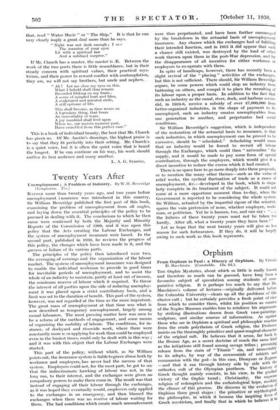Twenty Years After
Unemployment ; A Problem of Industry: ByW.H. Beveridge (Longmans. 218.) ilATITER more than twenty years ago, and two years before unemployment i nsurance was introduced in this country, Sir William Beveridge published the first part of this, book, examining the problem of 'unemployment from all angle's, and laying down the essential Principles of the policy to be pursued in dealing With it. The conclusions to which he then came Were confirmed by both the Majoriti. and Minority Reports of the Commission of 1609, and it Was upon this policy that the Acts creating the Labour Exchanges, and the system of unemployment insurance were based. In the second part, published in 1930, lie reviews the progress of this policy, the changes which have been Magnin it, and the success or failure of its various parts.
The principles of the policy then introduced were two, the averaging of earnings and the organization of the labour market. The system of unemployment insurance was designed to enable the individual workman to provide in good times for inevitable periods of unemployment, and to assist the whole of an industry to maintain, partly at least out of income, the minimum reserve of labour which it required. To throw the interest of all parties upon the side of reducing unemploy- ment it was placed upon a strict contributory basis, and a limit was set to the duration of benefit. This part of the System, however, was not regarded at the time as the more important. The great mass of unemployment at that time was what is now described as temporary unemployment, largely among casual labourers. The most pressing matter here was seen to be a reform of the methods of engagement, and some means of organizing the mobility of labour. TIM conditions, for in- stance, of dockyard and riverside work, where there were constantly more men applying for work than could be employed even in the busiest times, could only be dealt with in this way ; and it was with this object that the Labour Exchanges were started.
This part of the policy, without which, as Sir William points out, the insurance system is liable to grave abuse both by workmen and employers, has never had the success of that
• system. Employers could not, for the most part, be got to see that the indiscriminate hawking of labour was not, in the long run, to their interest, arid the exchanges were given no compulsory powers to make them come in. The result was that instead of engaging all their labour through the exchanges, as it was hoped they eventually would, employe/a only applied to the exchanges in an emergency, and then blamed, the exchanges when there was no reseive of labour waiting for them. The bad conditions which create much unemolovment were thus perpetuated, and have been further encouraged by the breakdown in the actuarial basis of unemployment insurance. Any chance which the exchanges had of fulfilling their intended function, and in 1915 it did appear that such a chance still existed, was destroyed by the load of other work thrown upon them in the post-War depression, and by the disappearance of all incentive for either workmen or employers to co-operate with them.
In spite of handicaps, however, there has recently been a slight revival of the " placing" activities of the exchanges, but this is not sufficient. There should, Sir William Beveridge argues, be some powers which could stop an industry from battening on others, and compel it to place the recruiting of its labour upon a proper basis. In addition to the fact that such an industry as the canal, river, dock, and harbour service did, in 1924-6, receive a subsidy of over £7,000,000 front better-organized industries, in the shape of payment to its unemployed, such an industry creates unemployables final one generation to another, and perpetuates bad social conditions.
Sir William Beveridge's suggestion, which is independent of the restoration of the actuarial basis to insurance, is that such industries, in which unemployment can be proved to be excessive, should be "scheduled." Scheduling would mean that an industry would be forced to recruit all labour through the Exchanges, which could then "rationalize the supply, and it would be made to pay some form of special contribution, through the employers, which would give it a direct incentive to reduce the excess which it had created.
There is no space here to go more deeply into these proposals, or to mention the many other themes—such as the value of relief works, the cyclical fluctuation of trade as a cause of unemployment, &c.—developed in the book, which is sings. lady complete in its treatment of the subject. It could not come at a more opportune moment than to-day, when the Government is reported to be considering the whole system. Sir William, actuated by the impartial rigour of the scientist, spares the vain pretension 'of none, whether employer, work- man, or politician. Yet he is human, too, and can say : the failures of these twenty years must riot' be token too hardly. After all, what :a twenty years they have been !"
Let us hope, that the next twenty years will give us less reason for such forbearance. If they do, it will be largely owing to such work as this book represents.








































 Previous page
Previous page